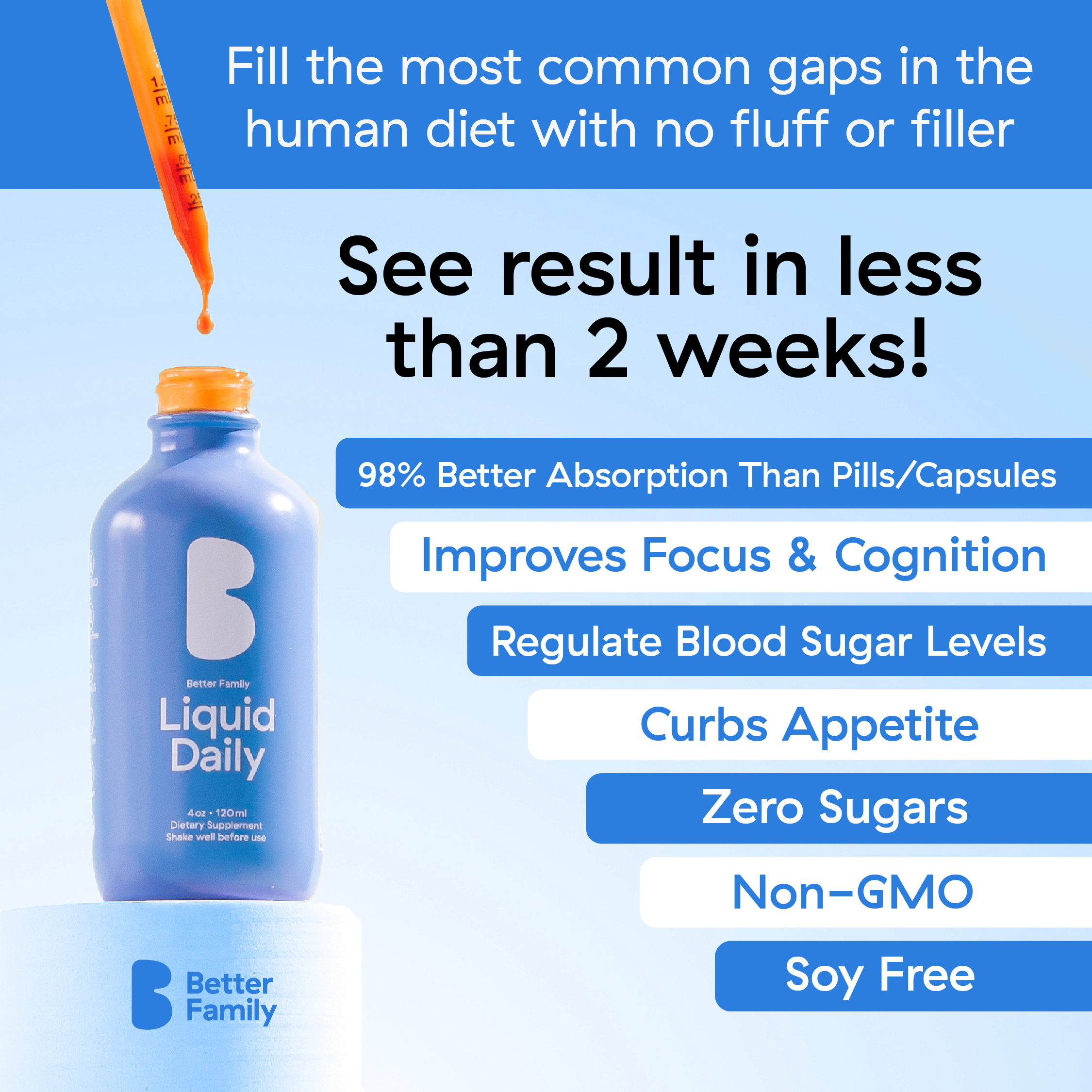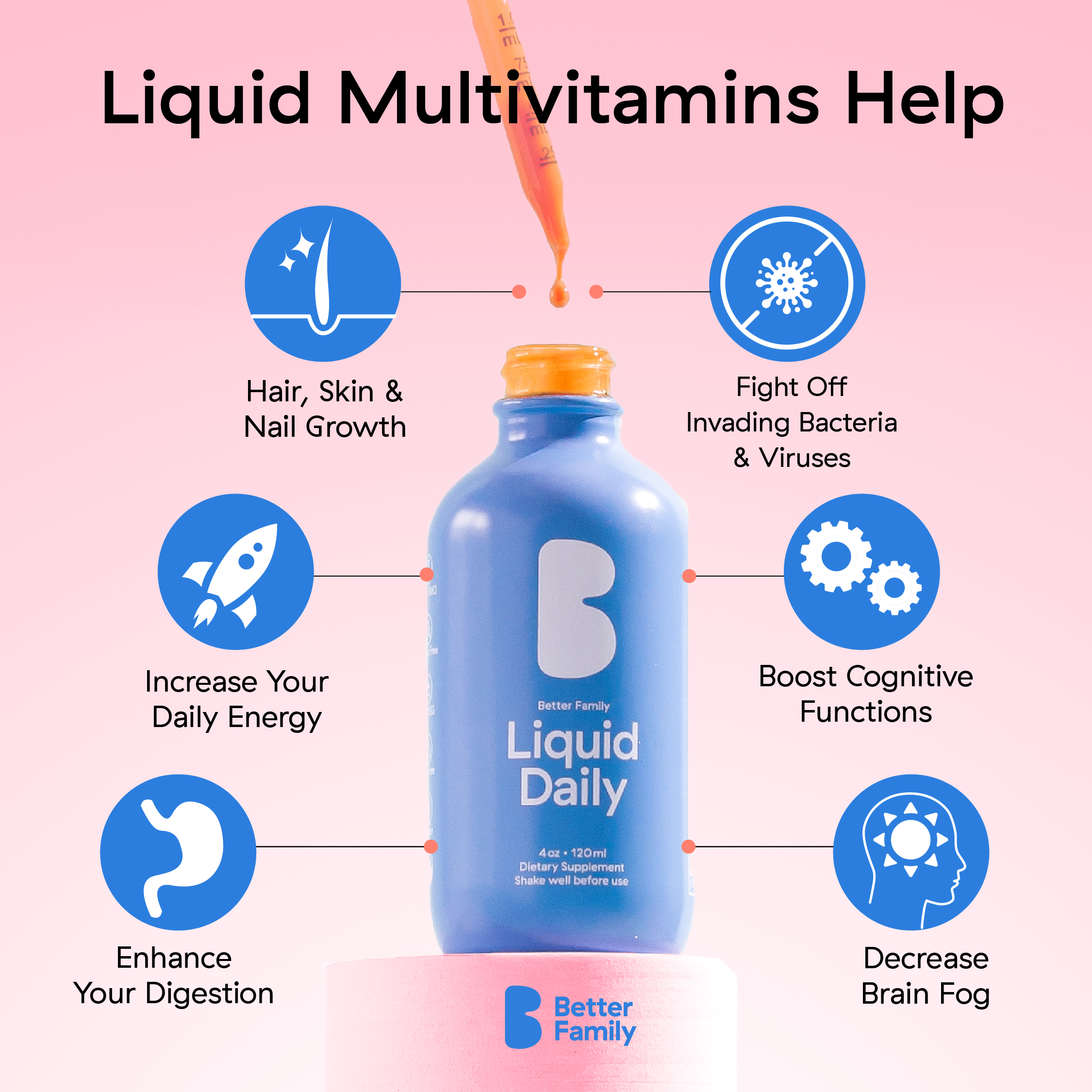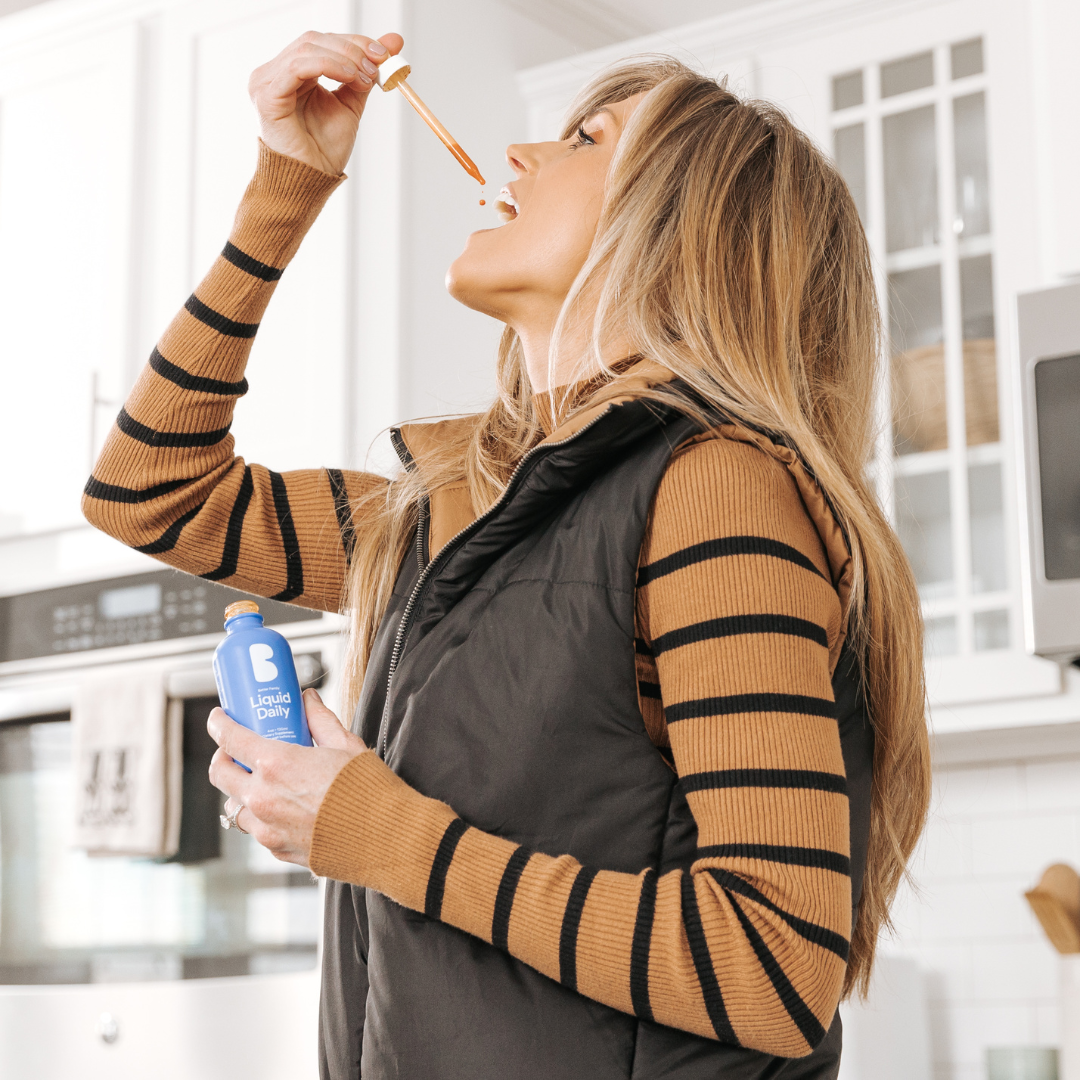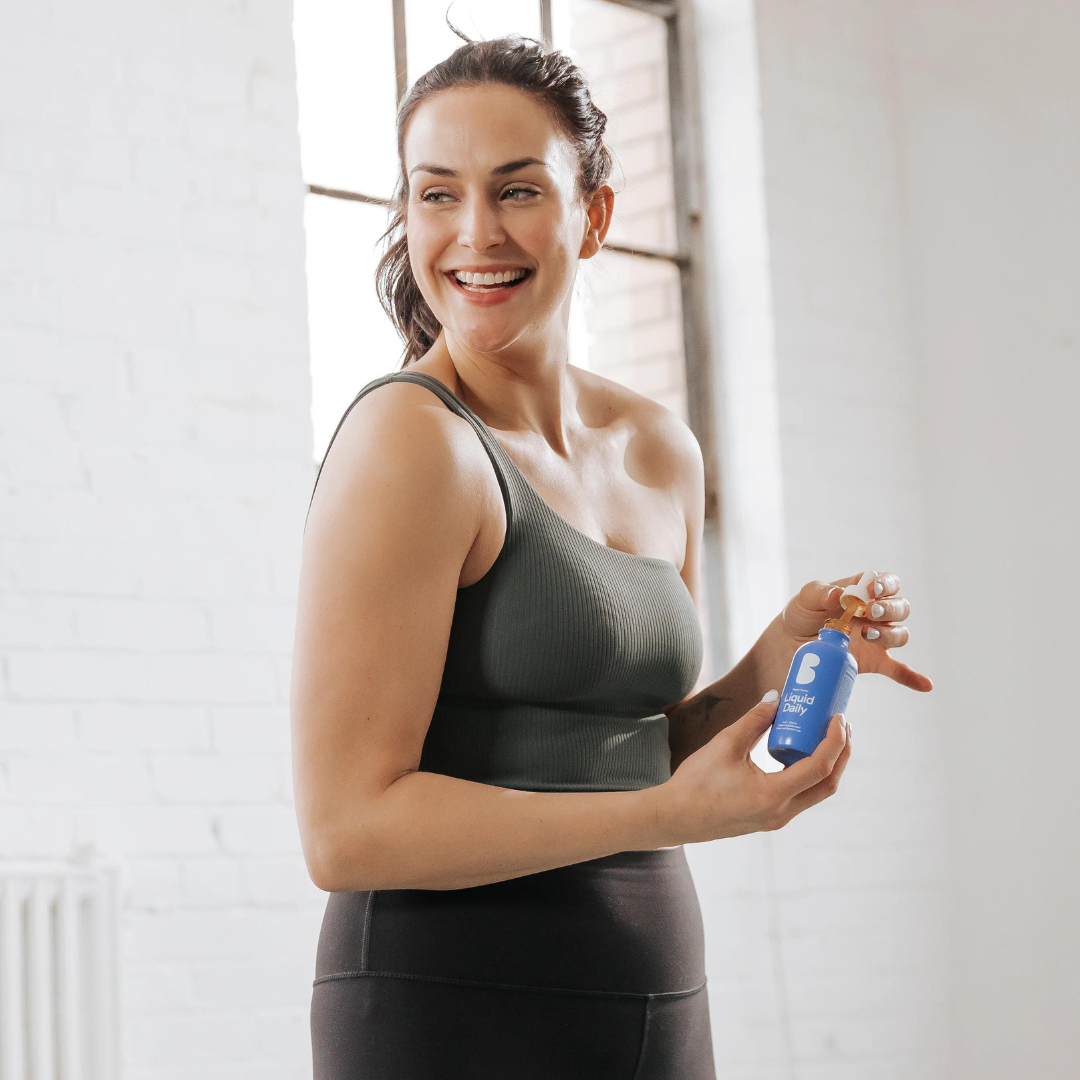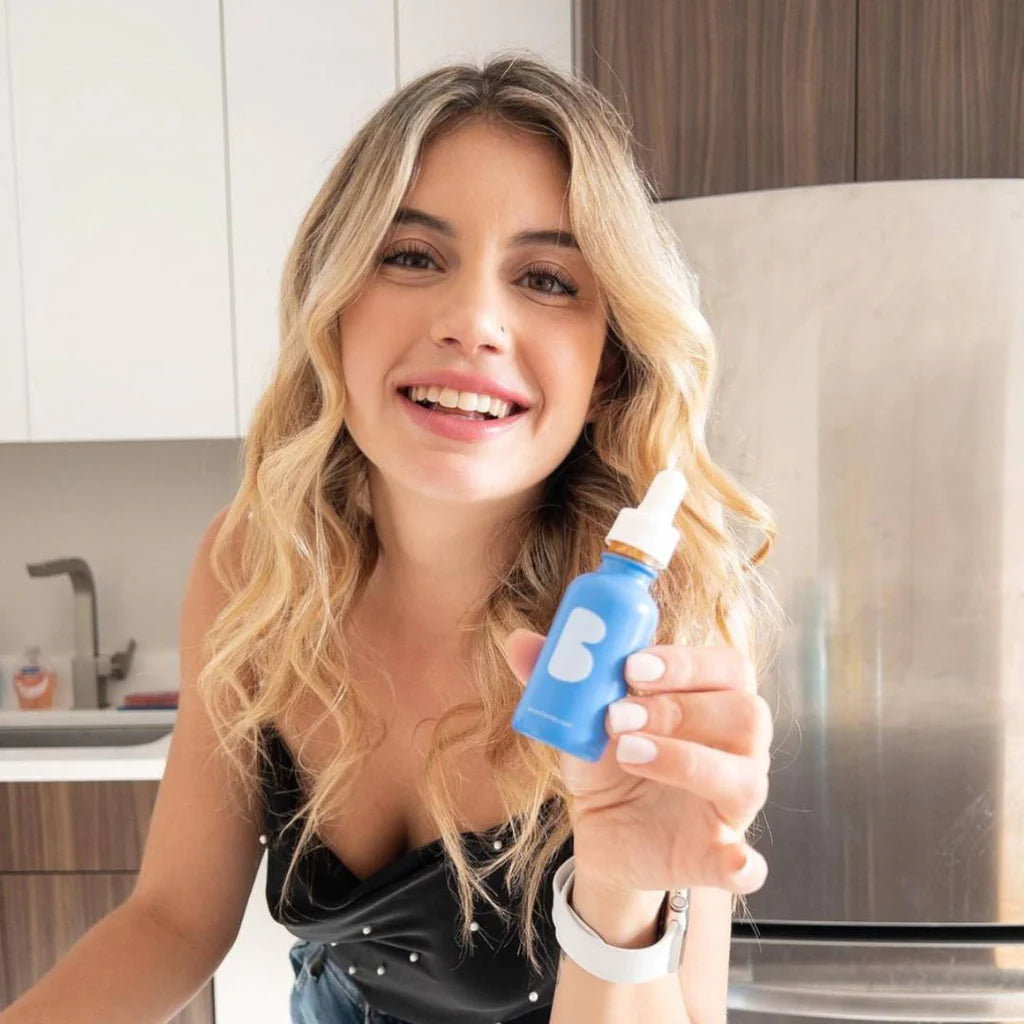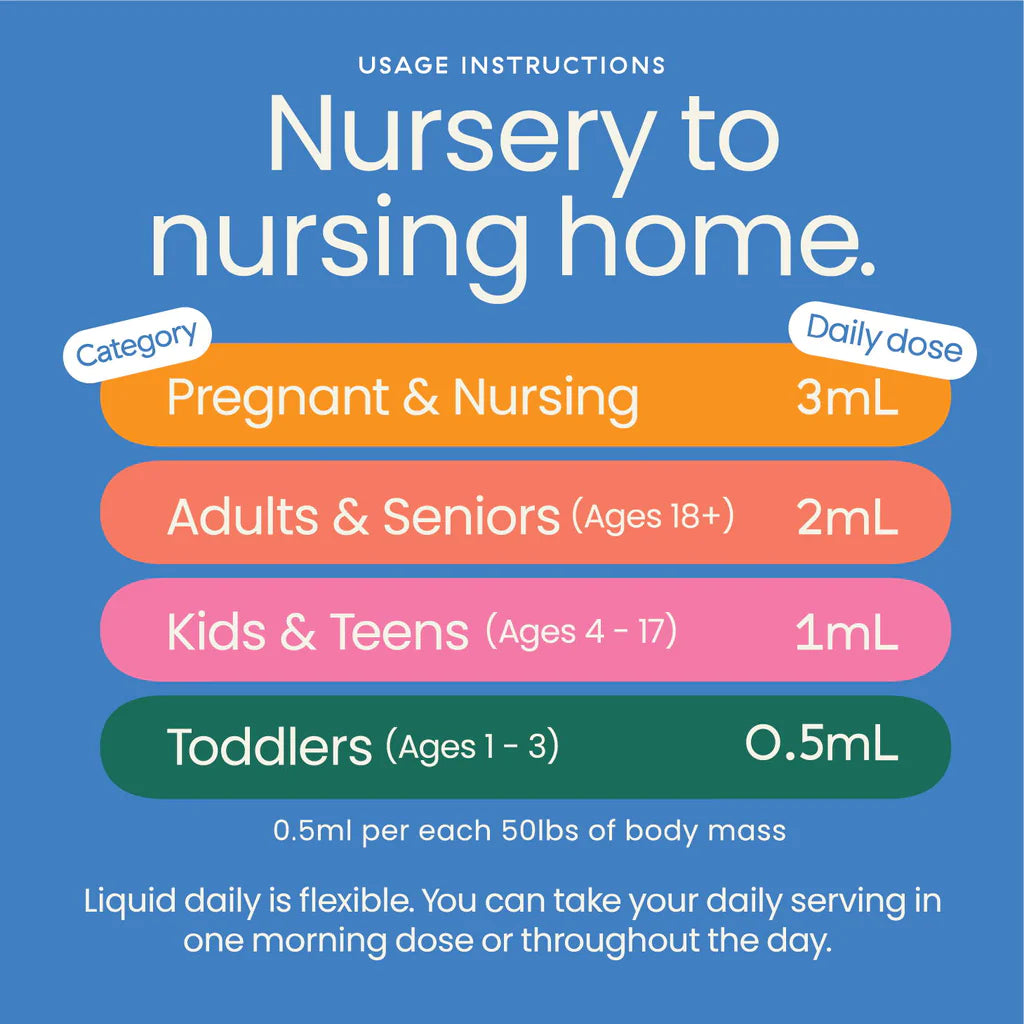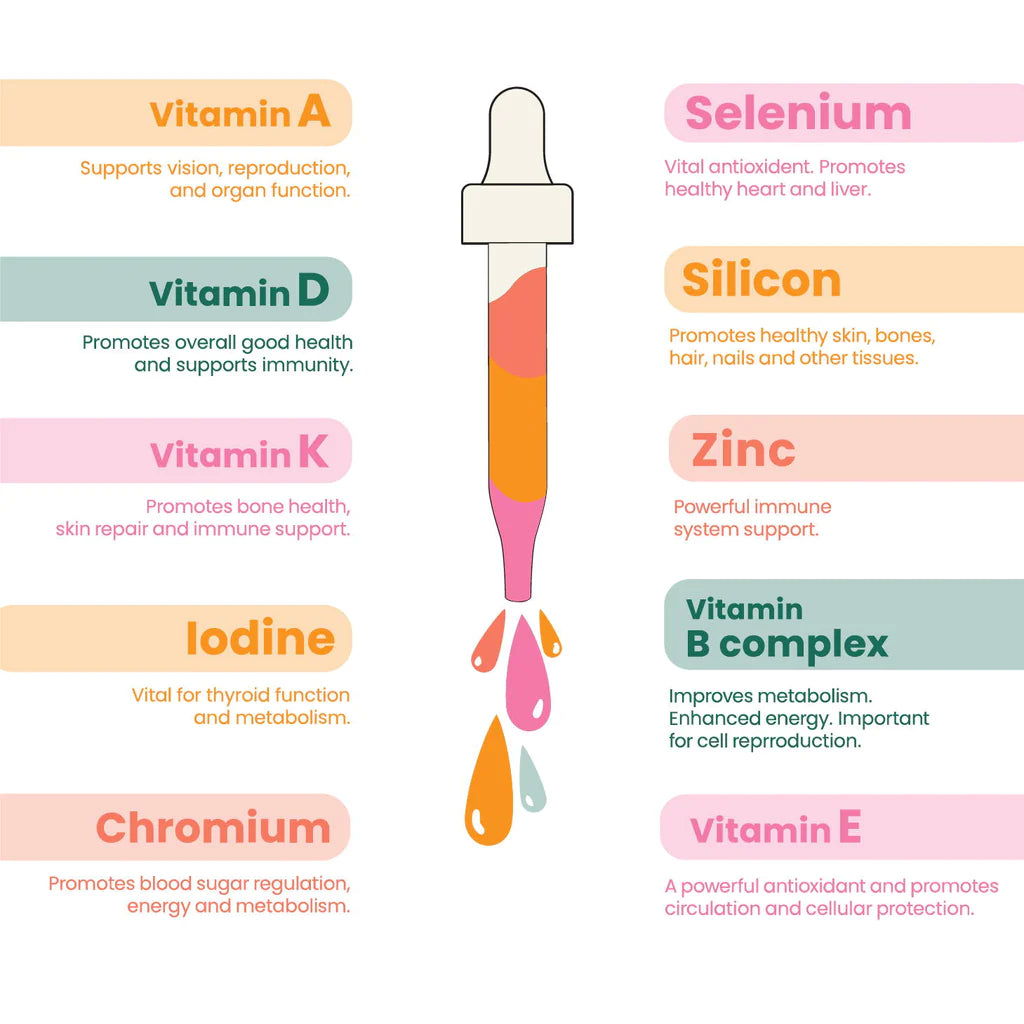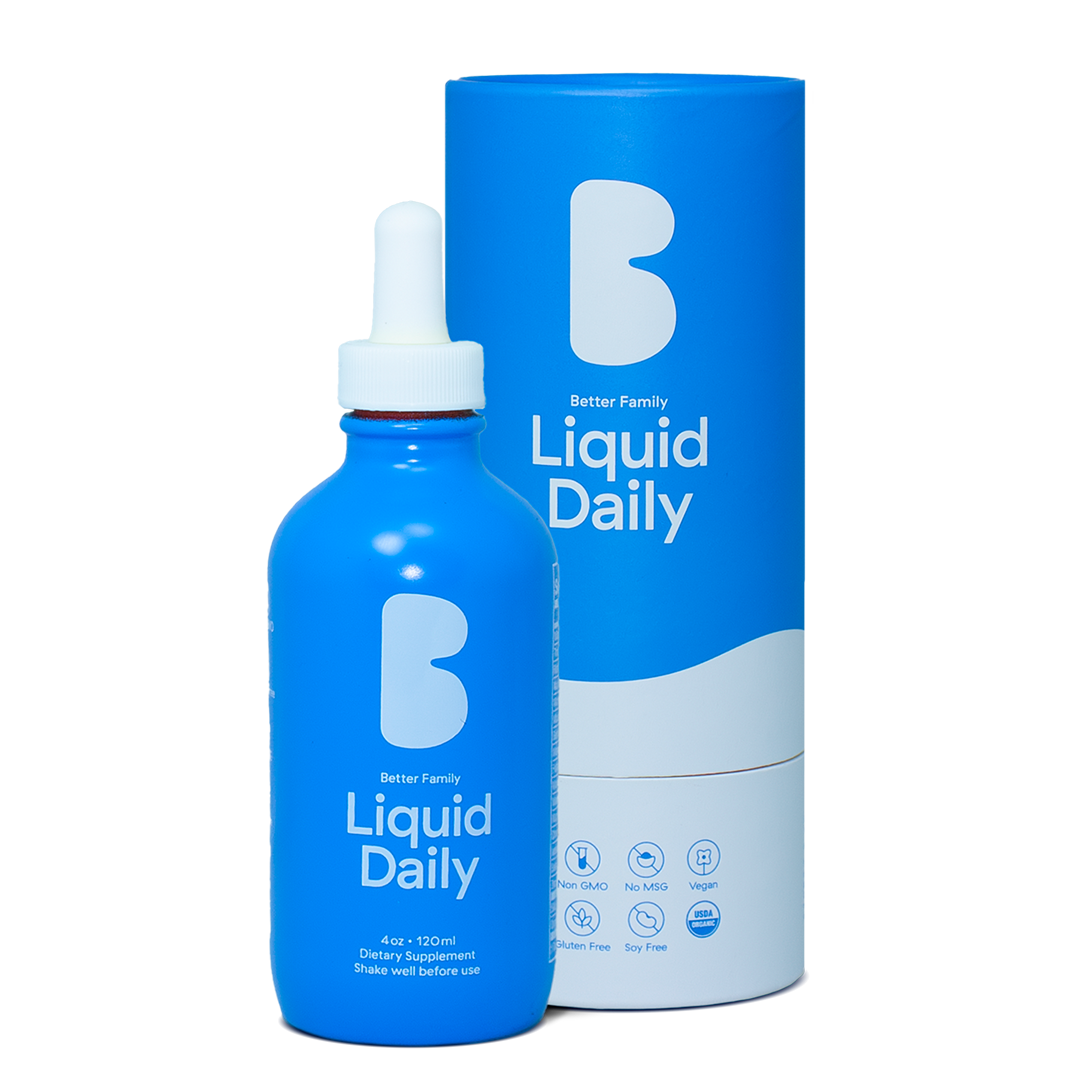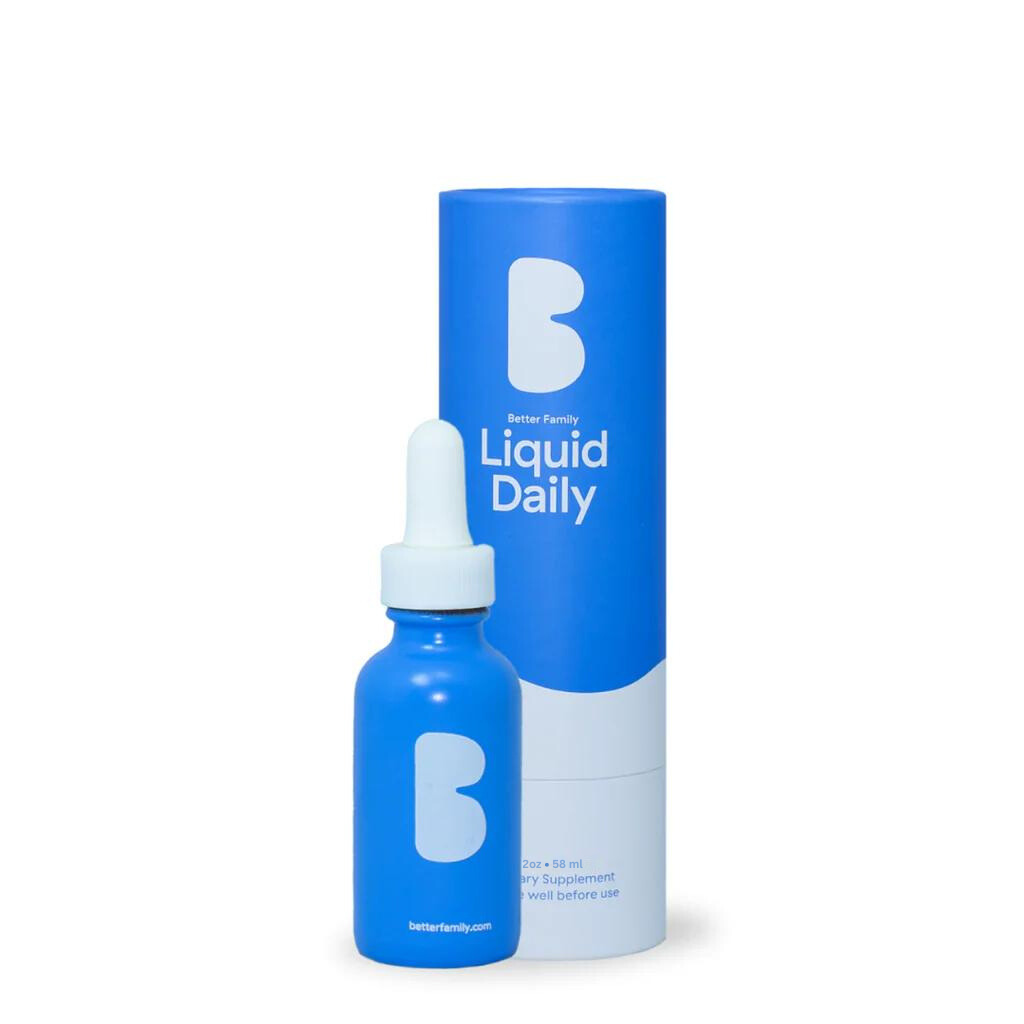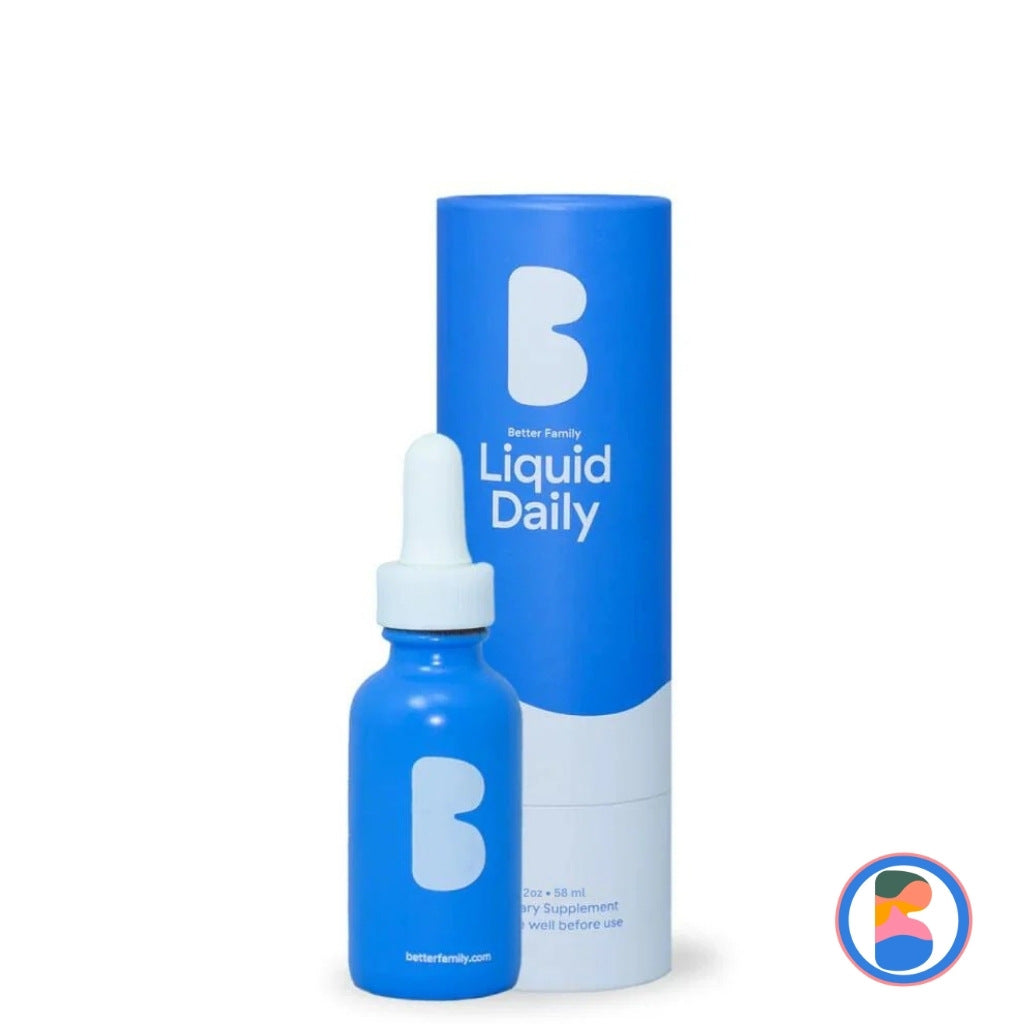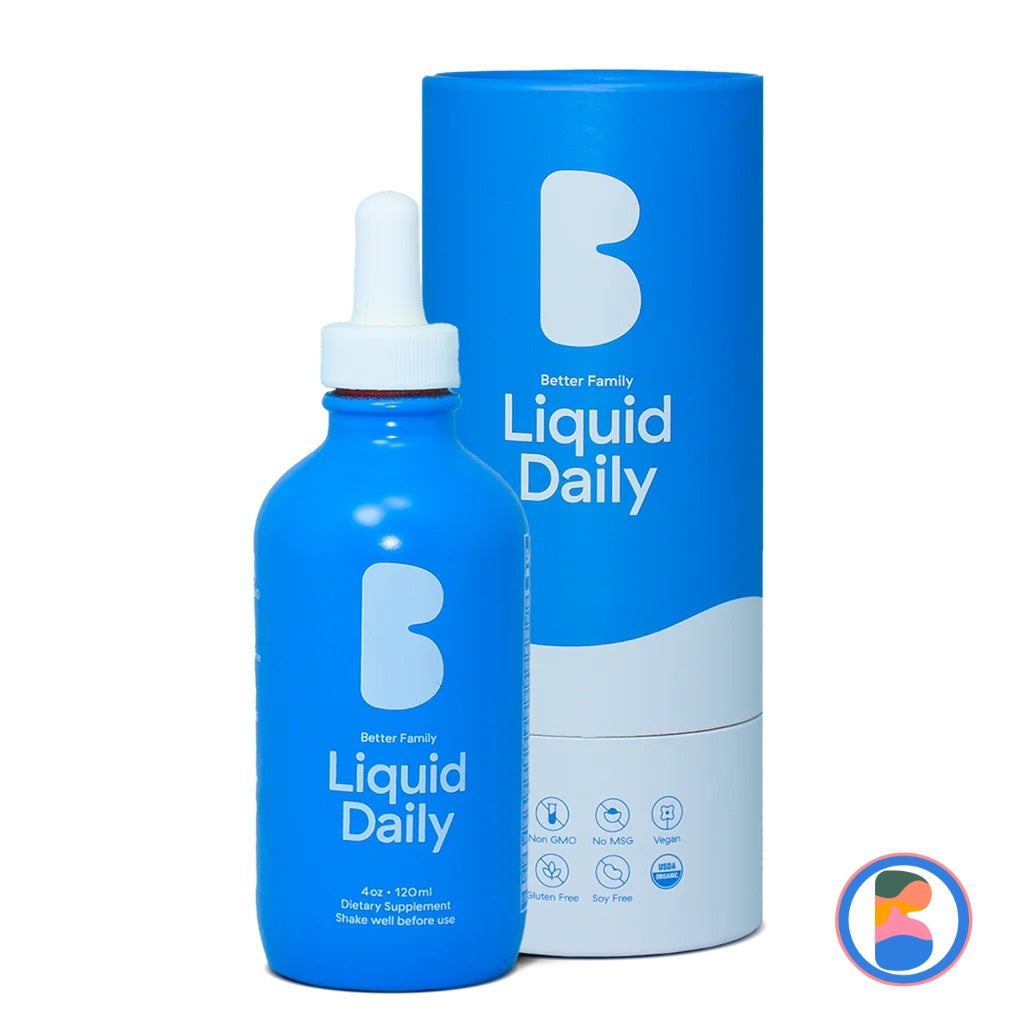Better Family Article Series
Liquid Multivitamins
The Absorption Advantage
This article series is brought to you by the team behind Liquid Daily: the better option for filling nutritional gaps in your household.
Liquid vs Pills or Chewables
Vitamins for Adults and Kids
Liquid Vitamin Delivery

Article Highlights
- Bioavailability plays a crucial role in determining how effectively our bodies can absorb and utilize vitamins.
- Bioavailability of vitamins and minerals often go hand in hand as they sometimes interact with each other in ways that affect absorption.
- At Better Family, one of the key factors that sets our products apart is our commitment to utilizing the most bioavailable forms of vitamins and minerals.
Bioavailable Vitamins
Vitamins are essential nutrients that are a necessary component of every person’s health — but did you know that some forms of vitamins are more difficult than others for your body to absorb and utilize? Vitamins that are more bioavailable are readily absorbed and put to work by your body, whereas vitamins that are less bioavailable are not as efficiently utilized.
If you want to keep yourself in optimal health, it’s important to understand the part bioavailability plays in the way vitamins benefit your body.
What Is Bioavailability?
Bioavailability plays a crucial role in determining how effectively our bodies can absorb and utilize vitamins. The term “bioavailability” refers to the amount of a nutrient that is absorbed into your bloodstream and available for your cells and tissues to use. The bioavailability of vitamins is influenced by various factors such as the form of the vitamin, the food source, and individual differences in metabolism.
Bioavailability Factors
One of the key factors that affects bioavailability is the form of the vitamin. Some vitamins exist in different forms, and these forms can vary in their ability to be absorbed and utilized by your body. For example, certain forms of vitamin E, such as alpha-tocopherol, have been found to be more bioavailable than others.
The type of food from which vitamins are sourced also plays a significant role in their bioavailability. Naturally occurring vitamins in whole foods are generally more bioavailable compared to synthetic forms found in supplements because whole foods contain other compounds that enhance absorption and utilization. For instance, vitamin C from fresh fruits and vegetables is more bioavailable due to the presence of bioflavonoids, which improve its absorption.
Individual differences in human metabolism can also affect the bioavailability of vitamins. Factors including your age, genetics, and overall health can influence how efficiently your body absorbs and utilizes essential nutrients. Certain health conditions, such as malabsorption disorders, can impair the absorption of vitamins and reduce their bioavailability.
"Incredible product. Has helped with sleeping and clarity at work. I would recommend for everyone. Very easy to use also."
- Paul E.
Experience the benefits of bioavailable vitamins with the lightly and naturally flavored liquid multivitamin that is packed with 20 essential vitamins and nutrients.
TRY LIQUID DAILYBioavailability of Minerals
As with vitamins, the bioavailability of minerals is the extent to which minerals can be absorbed and utilized by the human body. It’s crucial to understand the bioavailability of minerals as well, as mineral bioavailability impacts the effectiveness of minerals in supporting health and wellbeing. Similar to the bioavailability of vitamins, several factors influence the absorption and utilization of minerals.
Synergistic Nutrients
Bioavailability of vitamins and minerals often go hand in hand as they sometimes interact with each other in ways that affect absorption. For instance, the presence of certain vitamins can enhance or hinder the absorption of minerals.
Vitamin C, for example, improves the absorption of nonheme iron from plant-based sources. On the other hand, too much vitamin C can also inhibit the body’s ability to absorb copper, another important mineral.
Moreover, the presence of certain compounds in foods can also influence the bioavailability of minerals. For instance, vitamin D enhances the absorption of calcium from the intestines, which is crucial for maintaining healthy bones and teeth. Including vitamin D-rich foods in the diet or getting adequate sunlight exposure can optimize the bioavailability of calcium.
Understanding the way different vitamins and minerals interact with one another is critical for properly balancing your nutrient intake. We recommend you seek the advice of a trusted healthcare professional in this regard.
What Is the Best Form of Vitamin C for Absorption?
The best form of vitamin C for absorption is a topic of interest for many individuals. While ascorbic acid is the most commonly available form of vitamin C, there are other forms that may offer better bioavailability. For example, liposomal vitamin C and mineral ascorbates, which are buffered forms of vitamin C, have been found to have higher bioavailability and may be better absorbed by the body.
Most Bioavailable Vitamin D
The search for the most bioavailable form of vitamin D has long been a topic of interest among researchers and health enthusiasts. Vitamin D is a crucial nutrient that plays a vital role in maintaining bone health, supporting immune function, and regulating various physiological processes. While there are different forms of vitamin D available, one form that has shown promising results in terms of bioavailability is the microencapsulated form of vitamin D.
What Is the Most Bioavailable Form of Vitamin D?
The most bioavailable vitamin D is the form that can be efficiently absorbed and utilized by the body. Microencapsulation is a technique that involves coating tiny particles of vitamin D with a protective layer, usually made of lipids or polymers. This protective layer helps enhance the stability and solubility of the vitamin D particles, allowing for better absorption and utilization.
Vitamin D Microencapsulation
Some studies have suggested that the microencapsulated form of vitamin D may have superior bioavailability compared to traditional forms such as vitamin D3 or vitamin D2. The protective layer of the microencapsulated particles helps prevent degradation and enhances the absorption of vitamin D in the intestines. This may result in higher circulating levels of vitamin D in the bloodstream, leading to improved overall bioavailability.
Furthermore, the microencapsulated form of vitamin D has shown potential in addressing challenges related to low solubility and stability of vitamin D in certain formulations. By encapsulating the vitamin D particles, their solubility is improved, making it easier for the body to absorb and utilize this essential nutrient.
It is worth noting that further research is needed to fully explore the benefits and long-term effects of microencapsulated vitamin D. Additionally, individual factors such as genetics, overall health, and absorption capacity can also influence the bioavailability of vitamin D.
Try Liquid Daily
Liquid Daily is the all-in-one liquid multivitamin that is great for adults and children.
- 20 Essential Vitamins & Minerals
- Advanced Liquid Absorption
- Zero sugars, fillers, or artificial flavorings
- Safe & Effective for Kids & Adults!
Bioavailability of Food vs. Supplements
The bioavailability of nutrients from food versus supplements is a topic that often sparks discussion among individuals seeking optimal nutrition. Bioavailability refers to the extent to which nutrients are absorbed and utilized by the body — whether those nutrients are sourced from food or from supplements. When comparing the bioavailability of vitamins from food and supplements, several factors come into play.
One of the most important factors to consider is how food preparation methods affect vitamin bioavailability. Certain cooking techniques, such as boiling or steaming, can cause some vitamins to leach into the cooking water or be degraded by heat, reducing their bioavailability.
In contrast, supplements are generally formulated to provide specific nutrient amounts, but they may lack the additional compounds and enzymes present in whole foods that aid in nutrient absorption and utilization.
Is It Better to Get Vitamins from Food or Supplements?
The question of whether to obtain nutrients from food or supplements is a common one. While a well-balanced diet that includes a variety of whole foods is generally the best way to obtain essential nutrients, there are instances where supplements may be necessary.
Supplements can be useful for individuals with specific dietary restrictions, limited food choices, or certain medical conditions that affect nutrient absorption. However, it is important to note that supplements should not replace a healthy diet, as they may not provide the same synergistic effects of nutrients found in whole foods.
Your choice to get vitamins from food or supplements should depend largely on individual circumstances and preferences. In most cases, a diet rich in whole foods including fruits, vegetables, whole grains, lean proteins, and healthy fats provides a wide range of nutrients in their natural form. However, if you have difficulty meeting your nutrient needs through food alone, supplements can serve as a valuable complement.
"The vitamins are tasty and the number of essential vitamins all in one liquid is fabulous!"
- Kevin M.
No more pills or sugary gummies. Simplify your routine and fill the gaps in your nutritional diet with Liquid Daily.
TRY LIQUID DAILYBest Bioavailable Vitamins
If you’re searching for the best bioavailable vitamins, you should consider exploring Better Family products, as our line of multivitamin products are known for their bioavailable formulations that include the most essential vitamins and minerals. Our products prioritize nutrient absorption and utilization, ensuring that you can reap the maximum benefits from your multivitamin supplement.
Bioavailability from Better Family
At Better Family, one of the key factors that sets our products apart is our commitment to utilizing the most bioavailable forms of vitamins and minerals. We also keep ourselves up to date on the latest research and advancements in the field of nutrition to ensure that our supplements offer superior bioavailability.
Vitamin C supplements that are available in the form of liposomal vitamin C have been shown to have exceptional bioavailability compared to traditional forms. Liposomal vitamin C uses liposomes (tiny lipid spheres) to encapsulate the vitamin C molecules. This protective coating enhances absorption and ensures that a higher percentage of the vitamin C is effectively delivered to your cells, maximizing its benefits.
A vitamin D supplement in a microencapsulated form can further enhance the bioavailability of this essential nutrient. The microencapsulation process involves coating the vitamin D particles with a protective layer, improving their stability and solubility. As a result, your body can absorb and utilize vitamin D more efficiently, supporting various physiological processes and promoting overall health.
Better Family Supplements
By choosing Better Family products, you can trust that you are consuming the best bioavailable vitamins and minerals available. Our dedication to utilizing the most effective and bioavailable forms of nutrients means our liquid multivitamins are designed to provide optimal results.
Liquid Multivitamin
Liquid Daily is the all-in-one liquid multivitamin that can be added to any drink or juice!
- 20 Essential Vitamins & Minerals
- Advanced Liquid Absorption
- Zero sugars, fillers, or artificial flavorings
- USDA Organic
- Gluten-free, soy-free, AND non-GMO
Sublingual Absorption Rate
The sublingual absorption rate refers to the speed at which a medication or substance is absorbed through the sublingual route, where it is placed under the tongue. When it comes to sublingual absorption vs oral, sublingual absorption is generally known for its rapid and efficient nature, often offering faster absorption compared to oral administration.
Sublingual route advantages can be numerous over oral administration, primarily because we have a lot of blood vessels and blood flow right underneath our tongues, making this a perfect place to quickly absorb needed drugs. The direct contact with the highly vascularized sublingual mucosa allows medications to be absorbed directly into the bloodstream, bypassing the digestive system and the liver's first-pass metabolism. This results in a quicker onset of action and higher bioavailability.
Vitamin C, when administered sublingually, can demonstrate faster absorption compared to traditional oral supplementation. The sublingual route allows vitamin C to bypass the digestive system, where it may undergo degradation or altered absorption due to enzymatic processes. By directly entering the bloodstream, vitamin C sublingual absorption can result in more immediate availability and potential enhanced bioactivity.
It is important to note that the sublingual absorption rate can vary based on factors such as the specific medication or substance, and that you should always discuss taking any new medication, vitamin, or supplement first with your primary healthcare provider, such as your personal care physician. If you’re looking for a way to feel amazing, and make sure that your body is getting all of its needed nutrients, don’t forget to check out our liquid daily vitamin. With superior nutrient absorption, and ingredients designed to make you feel better, you can make sure you’re getting a daily dose of vital nutrients.
More articles from Better Family


